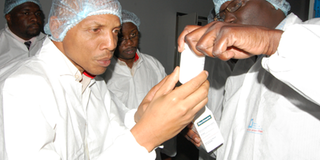Thousands of people on ARVs could be on wrong medication

Monitor Publications Managing Director Alex Asiimwe closely reads labels on an ARV drugs bottle as Mr Samuel Opio, the Quality Chemicals Ltd company pharmacist, explains the type of anti-retroviral drug which the company manufactures in Kampala yesterday.
PHOTO BY STEPHEN OTAGE
What you need to know:
Currently, about 300,000 people are on ARVs and medical experts say some of the drugs, which are especially bought from abroad, may not be suited for their bodies.
KAMPALA
The ARVs that some of the estimated 300,000 patients currently on treatment are receiving may not be meant for their body types, experts have said. But a study that was launched yesterday in Kampala is trying to ascertain that.
The National Drug Authority (NDA) is investigating the safety of anti-retroviral drugs to understand whether the ARVs are safe for the patients as well as ensure that health workers start recording the adverse effects of drugs on patients as a safeguard against law suits that may be brought against them for ill-advising patients.
The study to be conducted in conjunction with the Aids Control Programme of the Ministry of Health is to be undertaken in Masaka and Mbale regional referral hospitals because world over, Uganda has the highest number of patients that have come in contact with ARVs yet very little has been done to document their effects.
According to Ms Hellen Ndagije, the head of the National Pharmacovigilance and Drug Information Department at NDA, the routine system of monitoring drugs side effects has been in existence since 2005.She added that because of being a voluntary exercise, health workers have written few reports yet statistics from ACP indicate that many Ugandans are receiving ARVs.
Few reports
“So far the National Pharmacovigilance Centre in NDA has received only 200 reports on various ARVs. The launched study is aimed at getting the safety profile of one selected medicine Tenofovir, in a defined population which will prepare ground for using a similar approach in other public health programme in regional centers,” she said.
She added that much as government has improved availability and access of essential medicines, the widespread access must ensure widespread safety assessment which can only be done by the medicine users giving feedback to NDA.
The targeted spontaneous reporting method developed by the WHO is meant to cultivate the habit of informing patients the side effects of medicines.
ARVs are used as combinations and HIV patients usually have opportunistic infections and sometimes chronic ailments like tuberculosis, hypertension or diabetes and are as such prone to adverse effects from the cocktail of medicines since the medicines are not 100 per cent safe.
According to Mr Martin Oteba, the commissioner Pharmacy Division in the Ministry of Health, every regional referral hospital will be equipped with a drug information desk for patients to seek information on drugs.




